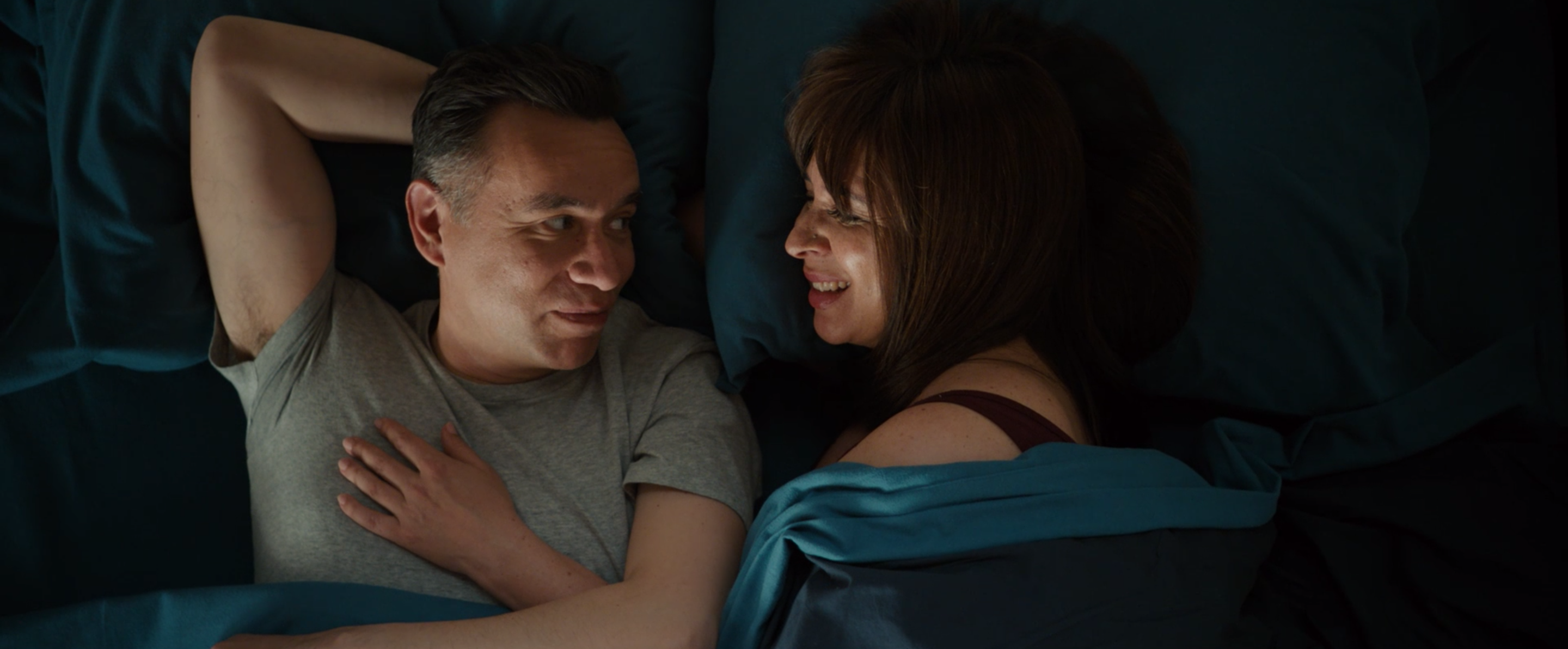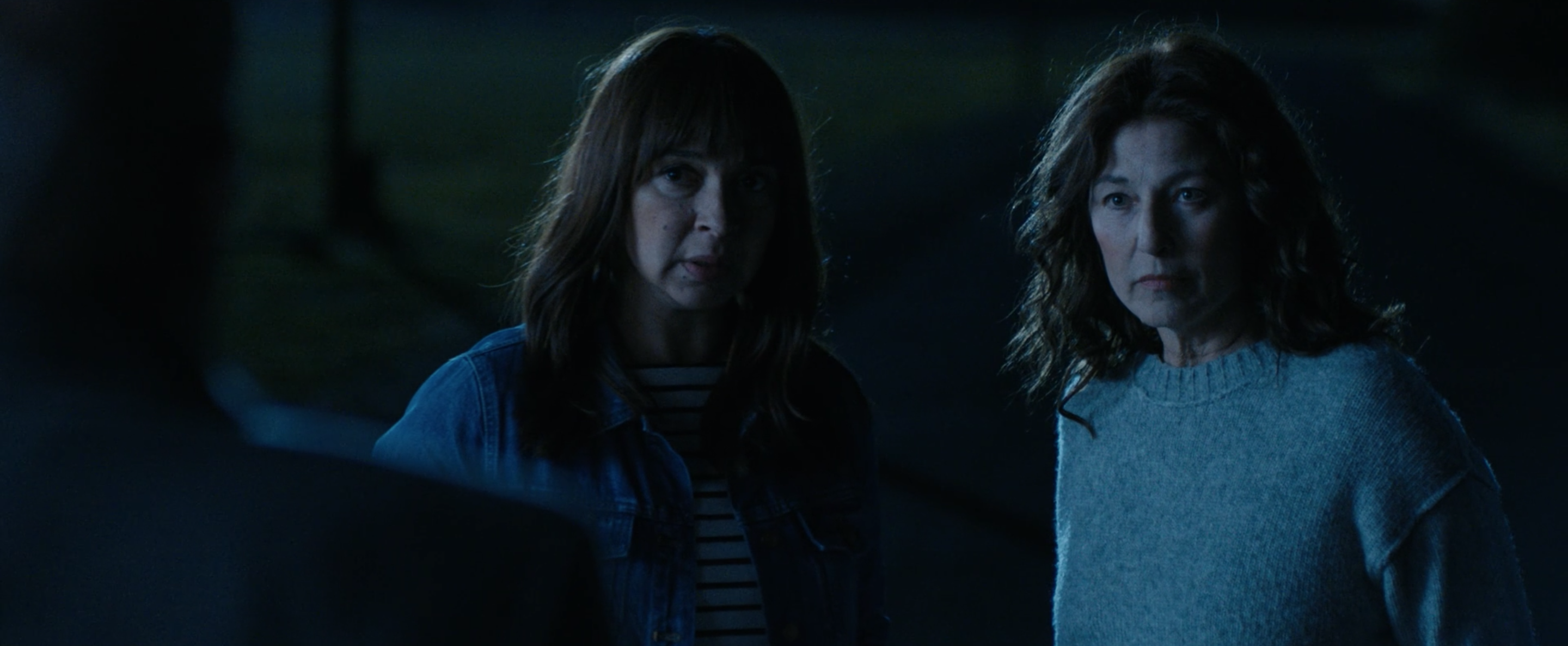In an interview with Vulture on the provenance of Forever, creators Matt Hubbard and Alan Yang say they settled on plopping Maya Rudolph and Fred Armisen in a surreal take on the afterlife instead of a heap of other brainstormed settings because “it was bringing up a lot of questions, obviously, that people have about who your soulmate is, what a marriage is, what a long-term relationship is, regrets you have, and the path not taken.” Well then, fuck me up, Forever.
(Warning: Spoilers ahead for Forever season one.)
Rudolph’s June and Armisen’s Oscar both die in the first couple of episodes and end up in a trippy take on…heaven? Hell? Neither because they’re ghosts? Purgatory (sure feels like it)? Simply put, they’re dead—”formers,” they call themselves—while the living are dubbed “currents.”
But before Oscar and June find themselves taken by The Big Sleep, we get a glimpse of their life together here on Earth via a montage of their annual trip to the same lake house. Oscar and June fish. Oscar cooks said fish. Oscar serves June dinner. He annually offers the same joke with each plate presentation—a sort of “voilà, dinner is served” hand gesture–bow combination. As the years tick by, June’s reaction to the bit evolves from ecstatic to bored to borderline resentful. As a viewer, if you’re currently grappling with any of Yang’s aforementioned questions about what longtime love really looks like, June’s eventual ennui is enough to supremely fuck with your head without even watching all eight episodes.

In Hanya Yanagihara’s novel A Little Life (voted by me the best book on which to leak mascara at your local Sweetgreen), a character argues that in love you can choose only three things you want from a person. “Sexual chemistry, let’s say, or good conversation, or financial support, or intellectual compatibility, or niceness, or loyalty … three. That’s it. Maybe four if you’re very lucky. The rest you have to look for elsewhere.” The passage goes on, “If you keep trying to find everything, you’ll wind up with nothing.”
I’m not naive enough to believe you truly Can Have It All. Everyone has flaws. No one is perfect (except for maybe Maya Rudolph). But I simply can’t believe I’ll end up with nothing if I look for sexual chemistry, good conversation, intellectual compatibility, niceness, and loyalty (I make my own paper; financial support need not apply—please hold your applause). Of course, this attitude is perhaps why all of my long-term relationships in my thirty years on this rock have ended. But when I look at couples that really seem to really have “it,” I have to believe they’ve got, at a minimum, five—maybe six or, hell, even seven—things. Right?!
I’m not sure how many things June and Oscar have. And maybe it’s the long-term, platonic, real-life friendship between Armisen and Rudolph that led me to believe “these characters are 1000% not fucking,” but the show did nothing to suggest that they’re doing anything other than missionary once a week. I did greatly enjoy their witty banter and propensity for random hypotheticals:
—”What’s the best activity of all time when you have exactly half an hour?”
—“What do you think is the all-time-best way to sit, ever?”
—“What’s the all-time-best beach food?”
But, both on Earth and when the two are reunited in the afterlife, their romance left me very little to root for.
Forks. My skepticism skyrocketed when I watched Oscar make a big passive-aggressive fuss over some damn forks. In their (holy shit, so enviable) midcentury modern afterlife abode, June puts them tines-down in the dishwasher. Oscar knows that tines-up is the cleanest path. Okay, sure. When he “solves” the problem by creating a condescending sign that says “Tines Up :),” this is the resulting exchange:
June: “You know that earlier we weren’t just talking about forks, right?”
Oscar: “Yeah, but this is about the forks.”
J: “I feel like maybe you’re not getting how I’m feeling.”
O: “Okay, then tell me!”
J: “I feel trapped.”
O: “What do you mean?”
J: “I mean we are actually trapped here. We can’t go too far from the fountain.”
O: “I’m sorry. That’s just how it works here.”
J: “How do we know there’s not something else?”
O: “Like what?”
J: “I don’t know. Something. Anything.”
Next comes some light banter about how well designed the house is, which thankfully helped me stifle some tears (is it apparent I’ve been in an “it’s not about the forks” situation once or twice before?). “Look at this house!” Oscar says. “Look at the flow from the kitchen to the living room; it’s seamless!” June responds, “I love this house! It’s very well decorated. And the bathroom here is way better than what we had, but it is NOT about the house. We do the same things every single day. And I don’t see it changing literally forever. And that bothers me.”
The argument ends unresolved because Oscar doesn’t mind the mundanity of their new “life,” at one point proclaiming, “I like it here!” June’s face at the end of the episode tells all: She’s finally said how she feels, and she’s invigorated. I was desperate for her to ditch this nerd and run off into the sunset with their life-hungry, spunky neighbor, Kase (the inimitable Catherine Keener) who, when their friendship strikes up, feeds June’s desire for “something. Anything.”

And run they do, to the chic, albeit somewhat Eyes Wide Shut–creepy Oceanside—a beachfront alternative to the suburban Riverside where she and Oscar had taken up residence. In the aforementioned Vulture piece, Yang said, “I think Oceanside is the right place for some of these people, but it’s the wong place for Oscar and June.” I disagree. Oscar, sure. He’s content with an eternity of sameness. But why, when June’s stated how unhappy Riverside makes her, does Oceanside have to be wrong for her?
In New York City, a “grass is always greener” mentality can really grab hold of folks. Apartments, jobs, people to date. There’s seemingly always something better—in-unit laundry or exposed brick, a human buffet via dating apps, a job with a better salary or a chic title or a ping-pong table in the office. The sheer breadth of options can render a lot of people perpetually dissatisfied. And that can be exhausting.
Forever didn’t make me think about death but instead life and how to live it.
On the other hand, why shouldn’t we be constantly trying to love where we live, date the best possible person, and feel fulfilled at work? Forever didn’t make me think about death but instead life and how to live it. Bear with me through my mild TV-induced anxiety attack: How do we figure out if we should be with an Oscar or a Kase? How do we know if we should stay in Riverside or move to Oceanside? Is there something to be said of the comfort and security that comes with staying with an Oscar? Or is that clearly trumped by the intrigue and adventure that a Kase might provide? On a Saturday night, maybe the latter is the answer, but how does that leave you feeling on Monday morning? Might I have a Xanax, please?
In a particularly memorable scene toward the season’s end, June fronts the Oceanside community mansion party band, belting Montell Jordan’s banger “This Is How We Do It.” She kills it (duh; see Maya Rudolph’s Prince cover band, Princess), and she’s thriving. She thrives, too, when she participates in some of the neighborhood’s most cinematic and seemingly exhilarating perks of being dead: walking into the ocean with the ability to breathe underwater and just be. Allowing your ghost body to get run over by the passing car of a “current,” free of consequence. Sure, the place has a vague eeriness to it, and the people seem sort of full of shit, but it’s also fun.
If I could time-travel to the writers room, here’s my pitch: Forget “This Is How We Do It.” What if, instead, June let us know she’d gotten all she could from Oscar and was entering a new chapter of independence in the afterlife? What if she dipped into everyone’s favorite breakup anthem, Ariana Grande’s “thank u, next”?
Or what if she gave us a soulful rendition of Nina Simone’s “Feeling Good”?
“It’s a new dawn / It’s a new day / It’s a new life for me, yeah / It’s a new dawn / It’s a new day / It’s a new life for me, ooh / And I’m feeling good.”
Or perhaps she could headbang her way through St. Vincent’s “Cheerleader.”
“But I—I—I—I—I don’t wanna be your cheerleader no more / I—I—I—I—I don’t wanna be your cheerleader no more.”
And what if, after that, while she’s showing off her pipes and the hopeless Oscar shows up unable to find his way back to Riverside—what if instead of inevitably ending up back with him, she just didn’t.
There’s a scene soon after this party when the two are discussing their crumbled relationship. June’s talking about the promotion she got right before she died. She admits that she initially bailed on the interview and explains that the reason she ended up with the job is because everyone else in the company was let go for embezzlement and an assortment of other white-collar crimes. While that’s true, the real reason she bailed was because she was having a quiet panic attack in the bathroom. The woman deserves ample slack; it was just one year after Oscar died. And the way Oscar died was fucked. They got in a dumb small fight that turned into a very serious big fight centered on whether or not to have kids. And before patching things up, the dude Sonny Bono’d himself and skied into a goddamn tree.
So much of the media we take in sells us this perfect idea of Being A Couple and presents it as the ultimate be-all and end-all.
“Sometimes I blamed you for being in the way of me becoming this hypothetical, amazing, new version of myself,” June says. “But I was never going to become that person.” He responds, “I knew you weren’t happy. And there were times where I wasn’t happy. But I was always afraid to talk to you about it. I think, in the back of my mind, I was scared that if we really did talk about our problems, you’d realize you were way out of my league.”
“Hey, I think we just had our first honest conversation ever,” June says. They don’t cry. They don’t hug. They part ways, seemingly fine with their freshly solidified choices and fates. It feels like a satisfying conclusion to a relationship that they just proved certainly didn’t possess enough of the “things” Yanagihara writes about in A Little Life.
It sort of reminded me of one of my favorite rom-com breakup scenes, in You’ve Got Mail when Meg Ryan’s Kathleen Kelly and Greg Kinnear’s Frank Navasky sweetly tell each other over a glass of wine that they’re simply not in love anymore, he asks, “Is there someone else?” “There is the idea of someone else,” she replies.
Even if Kase, whose relationship with June never quite crosses the line into the sexual or romantic, isn’t the specific “someone else,” I felt Forever set me up to hope that June’s second go at existing in this eternity would see her chasing that idea, whether it be in the form of another neighborhood, another person, or another “life.” But she doesn’t. She runs back to Oscar. Oscar with the deep, dull love of the comfort of monotonous routines and passive-aggressive lectures on what side of the fucking silverware should go up in the dishwasher. And Oscar who admits he was too insecure in their relationship to talk about their problems. It made me sad to think that these characters spent their limited time on Earth living with such monumental fears in their relationship, and even more so to think about how many relationships here in the world of real-life “currents” are anchored in the same fears and dissatisfaction.

Of course, had she stayed with Kase in Oceanside, June would miss Oscar. Leaving a relationship that’s stagnant but comfortable is terrifying. But the times that I’ve taken on that terror head-on have led to—not to get far too into Eat, Pray, Love territory—some of the most fulfilling periods of self-discovery. So much of the media we take in sells us this perfect idea of Being A Couple and presents it as the ultimate be-all and end-all. And while of course, duh, I love love, as each episode of Forever ticked by, I realized I wanted this to instead be a story of a woman taking control of her unhappiness and making decisions that aren’t propelled by this massive culturally instilled fear of being alone. I wanted her to be Ariana Grande or Nina Simone or St. Vincent. I wanted she and Kase to be Thelma and Louise (with, ya know, more of an emphasis on the liberation versus the murder).
“I don’t want to go back to Oceanside. Maybe we could go back to Riverside?” June asks Oscar (cue my audible ugggggh). He does, to his credit, admit that they shouldn’t go backward. This bone he throws her, along with the final scene—the couple magically walking through the ocean to emerge on another new beach—are, of course, hopeful. Perhaps their first and only honest conversation was all they needed to pivot into a forever of happiness together. Maybe June’s desire for more combined with Oscar’s ability to be her rock and tell her a good dumb joke any ol’ time make them a good match after all. Maybe some of us do need someone who will teach us how to load a damn dishwasher (*eyeroll*). Maybe the newfound honesty between the two will open up a new Yanagihara “thing,” or many new things, in their relationship.
But, then again, maybe not [actual photo of me trying to figure out Love: ¯\_(ツ)_/¯].
Forever clearly left me with more questions than answers. I’m not sure how many “things” we get, but I know that in my life here and now as a “current,” I’m after a whole damn heap of them. Perhaps that’s a lesson worth walking away with, and maybe just the answer I needed Allen and Yang to guide me to.
Oh, and now I know how to load a dishwasher properly, which will come in handy if I ever have one again. *pulls up Apartments.com*

